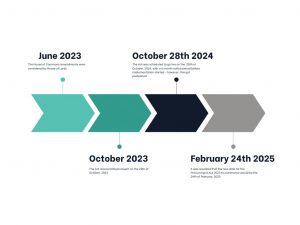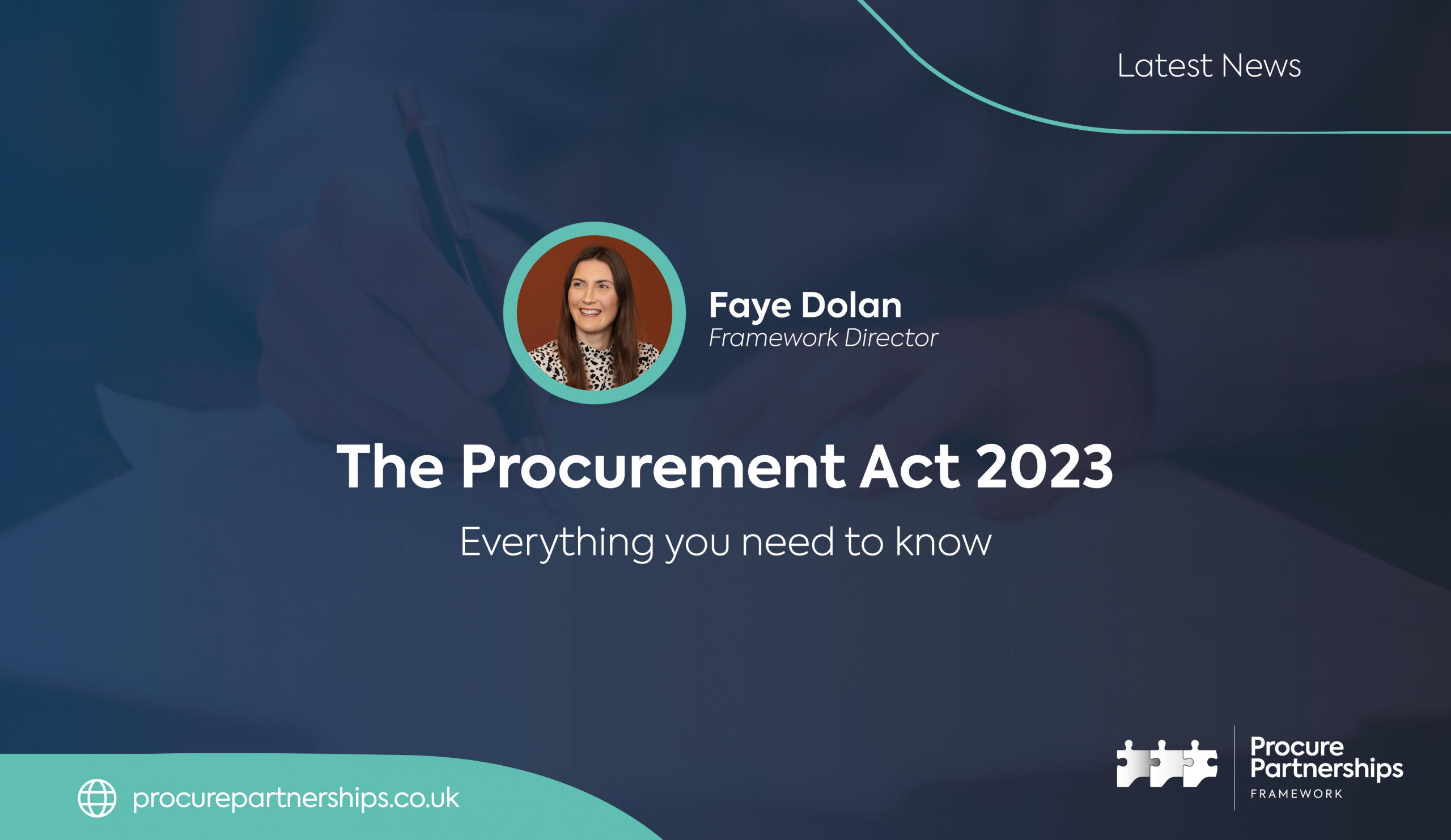(September 2025 Update) Six-Month Update
So, it’s been six months after the Procurement Act 2023 (PA23) came into effect. Now, public sector organisations delivering construction, infrastructure, demolition, and decarbonisation projects are starting to see how the new rules interact with existing procurement routes.
We wanted to provide an update answering some key questions we’ve encountered through the past six months, particularly those around projects procured under the Public Contracts Regulations 2015 (PCR15) and what notices and procedures are required for compliant call-offs. Your answers to these FAQs are outlined below.
Why it is still compliant to use a framework under PCR15
Now that the Procurement Act 2023 has come into effect, some contracting authorities are asking – is it still compliant to use a framework under PCR15? The position is clear:
- Any framework agreements procured before 24th February 2025 remain governed by the (PCR15) for their full duration.
- This means call-offs made through frameworks will continue to be compliant under PCR15, even after the Procurement Act has taken effect.
It is important to note that both suppliers and contractors must continue to ensure their compliance with PCR15 requirements when using a framework. The introduction of the Procurement Act does not retrospectively alter the legal basis of agreements already established.
PCR15: Supposed cut off
There has been some confusion in the sector about whether frameworks will be forced to stop calling-off projects under PCR15 after 2029. To be clear, the statutory cut-off date of 23rd February 2029 applies only to Dynamic Purchasing Systems (DPSs) and qualification systems created under PCR15, which must close by that date regardless of their original term (please see section 19 & 20 under commercial tools of the PA23 Guidance: Transitional and Saving Arrangements). From October 2024, DPSs are replaced by Dynamic Markets under the Procurement Act 2023, which are not subject to the 2029 cut-off and can continue to operate beyond that date.
Framework agreements are not affected by this automatic termination. This means projects can continue to be called off through a PCR15 framework beyond February 2029, provided the framework is still within its agreed duration (including any permitted extensions).
Preliminary Market Engagement Notices – Are they needed?
Do contracting authorities need to publish a Market Engagement Notice before awarding a call-off under a framework agreement? The answer is no. The government’s own Framework Guidance states:
“Whilst the provisions on preliminary market engagement … do not apply when awarding a call-off contract, contracting authorities may … publish preliminary market engagement notices prior to awarding a contract in accordance with a framework.”
This makes it clear that Preliminary Market Engagement Notices are not required when awarding a call-off under a framework.
- Mandatory position – Contracting authorities do not need to issue a Market Engagement Notice when using a framework to appoint a supplier.
- Voluntary option –Authorities may choose to publish one if they believe early engagement would be beneficial for market visibility, stakeholder reassurance, or transparency – but it is not a legal requirement.
A framework agreement has already undergone the necessary market engagement at the point it was established. This is why call-offs are exempt, the groundwork has already been done. Authorities can therefore proceed directly to award under the framework’s terms without duplicating that early-stage step.
Pipeline Notices – Are they needed?
Do contracting authorities need to publish a Pipeline Notice before awarding a call-off under a framework agreement? The answer is generally no. The government’s Pipeline Notice Guidance sets out the position:
“A contracting authority is required to publish a pipeline notice on the central digital platform where it considers that it will, in the coming financial year, pay more than £100 million under relevant contracts.”
(Paragraph 7)
“In the case of a framework, whilst a framework is a contract, the value of the framework itself is not taken into account. This is because payments will not be made under the framework itself, but instead will be made under each relevant contract awarded under the framework.”
(Paragraph 8)
“Whilst not required to do so under the Act, a central purchasing body … that is valued over £2 million … should publish a pipeline notice in order to provide visibility to the market.”
(Paragraph 9)
Pipeline notices, under key points and policy intent section 7,8,9
This means:
- Mandatory position (paras 7 & 8) – A Pipeline Notice is only legally required if a contracting authority expects to spend more than £100 million on relevant contracts in a single financial year. When calculating this threshold, the total value of the framework itself is not included – only payments due under the individual call-off contracts are counted. Unless forecasted spend under call-offs passes the £100 million threshold, there is no legal requirement to publish a Pipeline Notice.
- Voluntary option (para 9) – Even where the threshold is not triggered, central purchasing bodies establishing frameworks for others to use are encouraged to publish a Pipeline Notice if the framework is valued over £2 million. This is a best-practice transparency measure, not a compliance obligation – a “should do” rather than a “must do.”
When awarding call-offs under a framework, authorities do not need to publish a Pipeline Notice unless their call-off spend forecasts cross the £100 million threshold. Otherwise, publishing one remains entirely voluntary, intended to provide suppliers with early visibility of upcoming opportunities rather than to satisfy a legal requirement.
The other mandatory pipeline notices that must be published for call-off are the UK6 Contract Award Notice (to announce the award outcome and trigger any standstill period) and the UK7 Contract Details Notice (to confirm contract details after signature), alongside the corresponding publication on contracts finder.
In practice, this means contracting authorities can compliantly award projects through a framework by publishing the required UK6 and UK7 notices, without duplicating early-stage Pipeline Notices – unless their spend meets the £100 million threshold, or they choose to publish voluntarily as good practice.
We understand that public procurement is facing changes due to the implementation of the Procurement Act 2023. Here at Procure Partnerships Framework, we know how important it is to stay updated and informed in this transition.
Public sector organisations can rest assured knowing that we offer the assurance, support, and guidance they need for their construction procurement activities. You can rely on our framework knowing that it’s reputable, flexible, and fully compliant with PCR15 and PA23.
To further discuss your procurement needs, we encourage you to contact one of our regional Key Account Managers today. We look forward to supporting you and the delivery of your upcoming projects.
CIPs CEO reveals real obstacles
Ben Farrell, Global CEO of CIPS, reveals the real obstacle, frequent government changes creating a revolving door of new policies every few years, making long-term planning nearly impossible. As Auckland Transport shared with Ben: “We get a new government every three years. We can hardly plan beyond the end of our nose.”
Hear the full conversation on the Procure Partnerships Talking Procurement Podcast by signing up to our knowledge hub below:
Knowledge Hub Enquiry
(February 2025 Update) The biggest change in procurement laws for over 30 years comes into force
Well, the wait is over and today is the day. The Procurement Act 2023 has officially come into effect. These reforms are set to reshape the public procurement landscape, with a focus on greater transparency, improved payment practices, enhanced contractor accountability, and increased opportunities for SMEs. To recap, this update highlights some of the most significant changes that will impact both buyers and suppliers across the sector.
Contracting authorities will now have greater flexibility in award decisions, shifting from Most Economically Advantageous Tender (MEAT) to Most Advantageous Tender (MAT). This means factors such as social value, sustainability, and environmental performance will play a more prominent role in procurement decisions, rather than price being the primary driver.
For contracts exceeding £5 million, buyers must set and publish at least three key performance indicators (KPIs) to assess contractor performance. These KPIs will be reviewed annually, with performance data made publicly available. In cases of contract breaches or unsatisfactory delivery, authorities must publish notices outlining the issue, including any contract terminations or settlements.
The reforms also place a greater emphasis on SME participation, encouraging authorities to break large contracts into smaller lots to enable greater competition and open up opportunities for specialist suppliers. Additionally, contracting authorities must now publish quarterly reports on individual payments over £30,000, further reinforcing transparency within the procurement process.
For further guidance continue to read the below information for everything you need to know about the Procurement Act.
(October 2024 Update) The Procurement Act 2023 was set to go live in October 2024, but instead, will now commence on the 24th of February 2025
When the UK left the European Union in 2020, the Government charted a new course for trade. The goal – a system that’s much simpler, more flexible, and empowers the nation’s commercial ambitions while upholding global commitments and compliance.
The Procurement Act 2023 represents a significant change in procurement practices, aimed at modernising and improving how procurement is conducted.
However, what are the key changes and implications, and how will this affect procurement moving forward? Continue reading to learn everything you need to know about the Procurement Act 2023.
What is the Procurement Act 2023?
The Procurement Act 2023 is a new law that will create a new and improved set of regulations in procurement. The Act will be in place as an improvement of the Public Contracts Regulations 2015. The Act is set to offer more benefits, and better the regulations that we have currently.
The overall goals of the Procurement Act 2023 are to:
- Enhance efficiency
- Ensure fairness
- Deliver better value for money
- Ensure competition
- Allow buyers to meet urgent demands quickly
- Promote and improve transparency by granting access to public procurement data
From 2023 to 2024, gross spending on public sector procurement was £407 billion in the UK – which was an increase from the year before. The new Procurement Act 2023 will reform how this is spent, making it a lot simpler and quicker. Overall, the Act will bring in a few much-needed improvements.
Procurement Act 2023 Timeline
The new Procurement Act was set to go live in October, but as mentioned, it’s been held off. But what happened in the months before the implementation of the Act was postponed?
- May 2022 – a draft of the Procurement Bill was published by the Government
- June 2022 – a draft of the Procurement Bill was released, and commenced its journey through the House of Lords
- December 2022 – the Procurement Bill was passed by the House of Lords to the House of Commons
- February 2023 – the Act was reviewed at the committee stage in the House of Commons
The final few stages before the Act was meant to commence looked like this. Instead of going live on its set date of the 28th of October, 2024, it will now go live at the beginning of next year.

Why Has the Procurement Act 2023 Been Delayed?
So, why has there been a delay? As we know, the new Procurement Act 2023 was meant to go live later this month, but it has now been delayed to February next year.
The Government stated that they want the new regime to ‘go live with a bold and ambitious statement that drives the delivery of the Government’s missions’. However, they need additional time to deliver this, with plans to prepare for a smoother transition and effective implementation for both contractors and suppliers across the UK.
Although we don’t know too much about the delay, we know that the Government’s new statement will still hold the principles of their original plan while pushing for social value, value for money, and creating more opportunities for social enterprises and smaller businesses.
Key Changes in the Procurement Act 2023
Now we know that the Procurement Act 2023 is set to go live at the beginning of 2025, what key changes can we expect to see? Let’s find out.
1 – Contracts Can be Awarded on Non-Financial Criteria
One of the main changes within the new Procurement Act is that contracting authorities are to choose the Most Advantageous Tender (MAT) – not just the cheapest.
This means they can now consider a much wider range of factors beyond price (which is similar to the weighted point system used under PCR15 rules). So, in some cases, contracts can be rewarded based on non-financial criteria, such as:
- Quality
- Innovation
- Environmental impact
The new Procurement Act will also allow contracting authorities more freedom for direct awards in certain situations. This could potentially be used to protect public health, like during COVID-19, and to address urgent needs.
2 – Support for SMEs and Local Businesses
The Act will introduce measures to support and encourage the promotion of both small and medium-sized enterprises (SMEs), and local businesses.
Contracting authorities will be able to reserve contracts for these types of businesses and will be obligated to consider them more often throughout procurement processes. Essentially, the Act will streamline the procurement process for these business types and make it easier for them to participate in the process.
By enhancing transparency, SMEs and local businesses can better understand why certain decisions are made during the bidding process, allowing them to bid more successfully in the future.
3 – Promotion of National Priority Outcomes
A significant focus of the Procurement Act 2023 is that contracting authorities must consider how their procurement can promote national priority outcomes, as defined under PPN 05/21. This could include the following, which all fall under social value:
- Creating new jobs
- Creating new skills
- Tackling climate change
- Reducing waste
Under the new Act, we know that public sector buyers will now be legally required to award contracts based on the Most Advantageous Tender (MAT), rather than the Most Economically Advantageous Tender (MEAT).
By making public sector buyers award contracts based on MAT, broader community benefits can be considered, such as creating jobs for the local community, reducing carbon emissions, and utilising local suppliers – again, all aspects that contribute to social value.
4 – New Rules for Transparency and KPIs
The Procurement Act 2023 will also bring a significant change regarding transparency and key performance indicators (KPIs). It will aim to ensure better value for taxpayer money.
The new Act will make public authorities set up and publish at least 3 KPIs for any contracts that exceed £5 million. The KPIs will help track supplier performance throughout the contract, which will mean stronger monitoring and improved effectiveness.
However, this excludes certain contracts, such as those awarded through framework agreements. At Procure Partnerships Framework, we understand that the new procurement landscape can be uncertain, especially with existing tight deadlines and competing priorities.
We offer support and guidance throughout the entire procurement process – from pre-procurement, to tender support and assisting with project delivery. Although KPIs aren’t actually required for frameworks under the new Procurement Act, we choose to manage our contractor partners against KPIs during these three key phases to assist you in your project outcomes:
- Pre-construction
- Live construction
- Post-construction
Who Will the Procurement Act 2023 Impact?
The Procurement Act 2023 will have an impact across the UK once it comes into effect at the start of 2025 – but who exactly will be impacted the most?
Government Agencies
When the new Act comes into play, Government agencies across the country will need to implement new procurement rules in compliance with the set regulations.
This could include having to update internal procedures, train more staff, and adopt newer technologies to meet the requirements of the Procurement Act 2023.
Private Sector Suppliers
Those who supply goods and services to the public sector will probably experience changes in how they’ll engage with procurement opportunities in the future.
The Act will likely increase competition while keeping the bidding process as simplified as possible to make it easier for everyone involved. It’ll also present new challenges, like having to adapt to new procedures and opportunities, such as increased access to procurement markets.
Procurement Professionals
The roles and responsibilities of procurement officers in the UK will likely evolve under the new Act. There’ll be a greater focus on both strategic procurement and sustainability, as well as the use of digital tools and training being put in place to help adapt to the Act’s new requirements.
What the Procurement Act 2023 Means for You
Now that we have a clearer understanding of the Procurement Act 2023 and its effects, what does it mean for you? The new regulations under the Act will apply to all procurement agreements created after the go-live date on the 24th of February, 2025.
Any existing agreements created before the go-live date under the previous Public Contractor Regulation 2015 (PCR15), will continue to be governed by PCR15. At Procure Partnerships Framework, we are Public Contractor Regulation 2015 (PCR15) compliant – this means we will continue to be governed by PCR15.
It’s important to note that both suppliers and contractors must still ensure their compliance with PCR15, even when the new regulations take effect.
To put simply, contracts awarded before the new regulations come into play in February next year must continue to follow PCR15 compliance until the contract expires or is replaced.
Streamline Your Procurement Process With Procure Partnerships Framework
We understand that public procurement is facing changes in the near future due to the implementation of the Procurement Act 2023. Here at Procure Partnerships Framework, we know how important it is to stay updated and informed as we enter this transition.
Public sector organisations can rest assured knowing that we offer the assurance, support, and guidance they need for their construction procurement activities. You can rely on our framework knowing that it’s reputable, flexible, and fully compliant. We have 5 specialised frameworks, which are available for several sectors:
- Construction
- Infrastructure
- Demolition
- Decarbonisation
- Retrofit
To further discuss your procurement needs, we encourage you to contact one of our regional Key Account Managers today. We look forward to supporting you and the delivery of your upcoming projects.
Procurement Act FAQs
We hope to answer any questions you have regarding the new Procurement Act 2023. For additional information, we encourage you to visit our industry Q&A to learn more.
Where can I find more guidance?
We aim to update any information regarding the Procurement Act 2023, allowing our readers to find out everything they need to know regarding the Act and any changes that occur.
To learn more, the Government has released training products to support the new Procurement Act, which you can find more information about here. You can also find out about e-learning modules that will be put in place for the likes of staff who run tenders.
How should contracting authorities prepare?
Contracting authorities can prepare for the new Act by reviewing existing procurement processes, notifying suppliers, informing staff of the new regulations, and ensuring that all procurement information is up to date. It could also be beneficial for contracting authorities to appoint a procurement expert to assist them.
Will the new Procurement Act 2023 differ from the old EU rules?
The main difference is that the new Act is UK-centric. There’ll be more links to previous EU-derived public contract regulations. Additionally, the new Act will introduce newer approaches, bringing in more flexibility.



